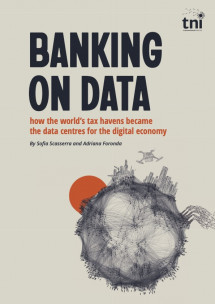Executive summary
In this new era of digital capitalism, data is the new raw material fueling the technology industry. This data is becoming increasingly important in terms of value, but above all in strategic terms.
Thus, companies are questioning where to store data in a way that is secure, accessible and inexpensive. This need has resulted in the signing of various Free Trade Agreements with the free flow of data clause, which states that companies can transport data across borders free of restrictions and tariffs. This clause is being signed in a growing number of Agreements between countries, but especially between countries belonging to the list of tax havens.
Not only are large technology companies storing their raw digital materials (data) in these locations, but there is also a growing link between them and global tax evasion. Never before in history have we seen companies with the profit rate of digital corporations, yet they are famous for the meagre tax payments they make annually.
In fact, there is a relationship that is not direct but that has been taking hold between tax havens and storage centres or data centres. We could say that financial power is gradually merging with technological power in the same geographical locations.
There are many reasons why this is happening:
- Tax havens have banking secrecy laws and make it difficult for governments to access private information. This responds to the interests of monopolising data by companies so that no one else can develop digital industry tools in the world: to monopolise the raw material in the hands of a few in order to eliminate competition and, above all, States that could potentially use data for better design of public policies, among other uses.
- Tax havens, being centres of wealth and handling of relevant information, have always been well-connected enclaves with a robust infrastructure. This is desirable when storing data, since good connectivity networks and physical infrastructure are needed to import and export data quickly and maintain servers internally within the country.
- Energy is the other key issue. Indeed, the large amount of energy consumed by data centres makes them the target of criticism from governments and civil society. This is why they are investing heavily in countries that are developing clean energy strategies to benefit their companies. Many tax havens are on this path and it is scandalous that while a country invests in the development of green energy, much of that energy goes to support data centres and not to the productive system or the population.
- Geographical location and points of exchange are, finally, the last reason why tax havens are chosen. As digital services advance and greater speed and precision are required for the development of new products, data centres must be housed in strategic geographic locations scattered around the world and with a strong capacity to exchange and distribute information. Tax havens contain both of these characteristics, which makes them attractive when it comes to fixing the physical infrastructure of the digital economy.
For these reasons there is a growing relationship between the two. The same geographic points where economic power is hidden today, is where large technology corporations seem to have chosen to hide information and digital power.




